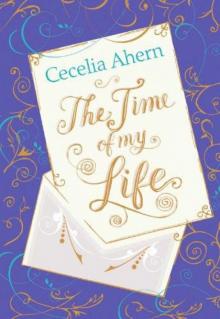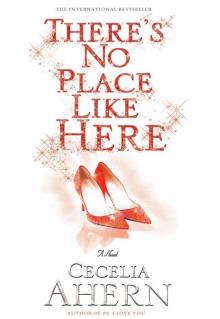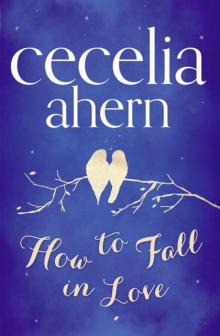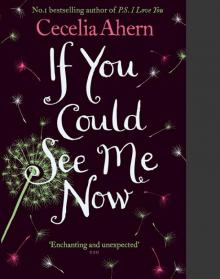- Home
- Cecelia Ahern
There’s No Place Like Here Page 3
There’s No Place Like Here Read online
Page 3
“Excuse me, you dropped something,” he called out.
She looked behind her in confusion and walked back to where the metal was glistening on the ground.
“Thank you.” She smiled, sliding what looked like a bracelet or a watch onto her wrist.
“No problem. Lovely day, isn’t it?” Jack felt the pain in his swollen cheeks worsen as they lifted in a smile.
Her green eyes sparkled like emeralds against her snow-white skin and glinted as they caught the sunlight streaming through the tall trees. Her jet-black curls twirled around her face playfully, revealing parts of her features, hiding others. She looked him up and down, taking him in as though analyzing every inch of him. Finally she raised an eyebrow. “Gorgeous,” she replied and returned the smile. She, her jet-black curly hair, the Styrofoam cup of coffee, legs and all, disappeared into the tiny car like a butterfly into a Venus flytrap.
Jack watched the Ford Fiesta drive into the distance, wanting her to have stayed, and once again he noted how things between him and Gloria, or perhaps just his feelings for her, were changing. But he hadn’t time to think about that now. Instead he returned to his car and leafed through his files in preparation for his meeting later that morning with Sandy Shortt.
Jack wasn’t religious; he hadn’t been to church for more than twenty years. In the last twelve months he had prayed three times. Once for Donal not to be found when they were searching the river for his body, the second time for the body in the alley not to be him, and the third time for his mother to survive her second stroke in six years. Two out of three prayers had been answered.
He prayed again today for the fourth time. He prayed for Sandy Shortt to take him from the place he was in and to be the one to bring him the answers he needed.
7
The porch light was still on when Jack arrived home. He insisted on it being left on all night for Donal’s sake, as a beacon to guide his brother home. He turned it off now that it was bright outside and tiptoed around quietly, careful not to wake Gloria, who was enjoying her Sunday lie-in. Scouring through the linen basket of dirty clothes, he grabbed the least crumpled garment he could find and quickly changed out of one check shirt and into another. He hadn’t washed as he didn’t want the electric ceiling fan in the bathroom to wake her. He’d even held back from flushing the toilet. He knew it wasn’t his overflowing generosity that was causing him to behave that way and yet he couldn’t quite summon the shame in knowing that it was exactly the opposite. He was deliberately keeping his meeting with Sandy Shortt a secret from Gloria and the rest of his family.
It was as much to help them as it was to help him. In their hearts, they were beginning to move on. They were trying their utmost to settle back into their lives after the major upheaval and upset of suffering the loss of not one but two family members in one year. Jack understood their positions. They had all reached a point where no more days off work could be taken, sympathetic smiles were being replaced by everyday greetings, and conversations with neighbors were returning to normal. Imagine, people were actually talking about other things and not asking questions or offering advice. Cards filled with comforting words had stopped landing on his doormat. People had gone back about their own lives, employers had moved around shifts as much as possible, and now it was back to business for all concerned. But to Jack it felt wrong and awkward for life to resume without Donal.
Truthfully it wasn’t Donal’s absence that held Jack back from joining his family in bravely carrying on with the rest of his life. Of course he missed him. His heart ached from how much he missed him. But, as with the death of his mother, he could and would eventually get through the grief. Instead it was the mystery that surrounded his disappearance; all the unanswered questions left question marks dotting his vision like the aftermath of flash photography.
He closed behind him the door to the cluttered one-bedroom bungalow where he and Gloria had lived for five years. Just like his father, Jack had worked as a cargo handler at Shannon Foynes Port his entire working life.
He had chosen Glin village, thirteen kilometers west of Foynes, for the meeting point with Sandy Shortt as it was a place none of his family inhabited. He sat in a small café at nine A.M., a half hour before they were due to meet. Sandy had said on the phone that she was always early and he was eager, fidgety, and more than willing to give this fresh idea a go. The more time they had together, the better. He ordered a coffee and stared at the most recent photograph of Donal on the table before him. It had been printed in almost every newspaper in Ireland and seen on notice boards and shop windows for the past year. In the background of the photo was the fake white Christmas tree his mother had set up in the living room every year. The baubles caught the flash of the camera and the tinsel twinkled. Donal’s mischievous smile grinned up at Jack as though he was taunting him, daring him to find him. Donal had always loved playing hide-and-seek as a child. He would stay hidden for hours if it meant winning. Everyone would become impatient and declare loudly that Donal was the winner just so that he could leave his place with a proud beaming smile. This was the longest search Jack had ever endured and he wished his brother would come out of his hiding place now, show himself with that proud smile and end the game.
Donal’s blue eyes, the only similar feature between the two brothers, sparkled up at Jack and he almost expected him to wink. No matter how long and hard he had stared at the photograph, he couldn’t inject any life into it. He couldn’t reach into the print and pull his brother out; he couldn’t smell the aftershave he used to engulf himself in, he couldn’t ruffle his brown hair and ruin his hair-style as he annoyingly had, and he couldn’t hear his voice as he helped their mother around the house. One year on he could still remember the touch and smell of him, though, unlike the rest of his family, to him the memory alone wasn’t enough.
The photo had been taken the Christmas before last, just six months before he went missing. Once a week, Jack would call around to his mother’s house, where Donal lived-the only one of six siblings who remained. Apart from the small talk between Jack and Donal that lasted for no more than two minutes at a time, that Christmas was the last occasion Jack had spoken to Donal properly. Donal had given him the usual present of socks and Jack had given him the box of handkerchiefs his oldest sister had given him the year before. They’d both laughed at the thoughtlessness of their gifts.
That day, Donal had been animated, happy with his new job as a computer technician. He’d begun it in September after graduating from Limerick University; a ceremony at which their mother had almost toppled off her chair, such was the weight of her pride for her baby. Donal had spoken confidently about how he enjoyed the work, and Jack could see how much he had matured and become more comfortable after leaving student life behind.
They had never been particularly close. In the family of six children, Donal was the surprise baby, nobody more surprised than their mother, Frances, who was forty-seven at the time she learned of the pregnancy. Being twelve years older than Donal meant that Jack had moved out of the house by the time Donal was six. He lost out in knowing the secret sides to his brother that only living with someone brought, and so for the past eighteen years they had been brothers, but not friends.
Jack wondered not for the first time whether, if he had known Donal better, he could have solved part of the mystery. Maybe if he’d worked harder at getting to know his little brother or had had more conversations about something rather than nothing, then perhaps he could have been out with him on the night of his birthday. Maybe he could have prevented him from leaving that fast-food restaurant or maybe he could have left with him and shared a taxi.
Or maybe Jack would have found himself in the same place as Donal was right now. Wherever that place was.
8
Jack slugged back his third cup of coffee and looked at his watch. Ten fifteen.
Sandy Shortt was late. His legs bounced up and down nervously beneath the table, his left hand drummed on the wood a
nd his right hand signaled for another coffee. His mind stayed positive. She was coming. He knew she would come.
Eleven A.M., he tried calling her mobile number for the fifth time. It rang and rang and finally, “Hello, this is Sandy Shortt. Sorry I’m not available at the moment. Leave a message and I’ll call you back as soon as I can.”
Jack hung up.
Eleven thirty, she was two hours late and once again Jack listened to the voice message Sandy had left the previous night.
“Hi, Jack, Sandy Shortt here. I’m ringing to confirm our meeting tomorrow at nine thirty A.M. in Kitty’s Café in Glin. I’m driving down tonight.” Her tone softened. “As you know, I don’t sleep,” she laughed lightly. “So I’ll be there early tomorrow. After all our conversations I look forward to finally speaking with you in person, and Jack”-she paused-“I promise you I’ll do my best to help you. We won’t give up on Donal.”
Twelve o’clock, Jack played it again.
At one o’clock, after countless cups of coffee, Jack’s fingers stopped drumming and instead made a fist for his chin to rest on. He had felt the café owner’s gaze on his back as he sat for hours waiting nervously, watching the clock, and not giving up his table to a group willing to spend more money than he. Tables filled and emptied around him; his head snapped up every time the bell over the door rang. He didn’t know what Sandy Shortt looked like; all she had said was that he couldn’t miss her. He didn’t know what to expect but each time the bell tinkled, his head and his heart both lifted with hope and then fell as the newcomer’s gaze flitted past his and settled on another.
At two thirty, the bell rang once more.
After five and a half hours of waiting, it was the sound of the door opening and closing behind Jack.
9
For almost two days I’d stayed in the same wooded area, jogging back and forth trying to re-create my movements and somehow reverse my arrival here. I ran up and down the mountainside, testing different speeds as I struggled to remember how fast I’d been running, what song I’d been listening to, what I’d been thinking of, and what area I was in when I first noticed the change in my location. As though any of those things had any part in what happened. I walked up and down, down and up, searching for the point of entry and, more importantly, the point of exit. I didn’t want to sleep, I wanted to keep busy. I didn’t want to settle like the personal possessions scattered around; I didn’t want to end up like the backless earrings that glinted from the long grass.
Thinking you’re missing is a bizarre conclusion to arrive at. I’m well aware of that. But it wasn’t a sudden conclusion, believe me. I was hugely confused and frustrated for those first few hours but I knew that something more extraordinary than taking a wrong turn had occurred because geographically, a mountain couldn’t just rise from the ground in a matter of seconds, trees that had never grown before in Ireland couldn’t all of a sudden sprout from the ground, and the Shannon Estuary couldn’t dry up and disappear. I wasn’t simply lost-I was somewhere else.
I did, of course, contemplate the fact that I was dreaming, that I had fallen and hit my head and was currently in a coma or that I’d died. I did wonder about whether the anomalous nature of the countryside was pointing toward the end of the world and I questioned my knowledge of the geography of West Limerick. I did indeed consider very strongly the fact that I’d lost my mind. This was number one on the list of possibilities.
But when I sat alone for those days and thought rationally, surrounded by the most beautiful scenery I’d ever seen, I realized that I was most certainly alive, the world had not ended, mass panic hadn’t taken over, and I was not just another occupant of a junkyard. I realized that my searching for a way out was clouding my view of where exactly I was. I wasn’t going to hide behind the lie that I could find a way out by running up and down a hill. No deliberate distractions to block out the voice of reason for me. I am a logical person and the most logical explanation out of all of the incredible possibilities was that I was alive and well but missing. Things are as they are, no matter how bizarre.
Just as it was beginning to get dark on my second day, I decided to explore this curious new place by walking deeper through the pine trees. Sticks cracked beneath my sneakers, the ground was soft and bouncy, covered with layers of fallen, now decayed leaves, bark, pine cones, and velvet-like moss. Mist hovered like wispy cotton above my head and stretched to the tips of the trees. The lofty, thin trunks extended up like towering wooden pencils that colored the sky. During the day they tinted the ceiling a clear blue, shading wispy clouds and orange pigment, and now by night the charcoaled tips, burned from the hot sun, darkened the heavens. The sky twinkled with a million stars, all winking at me, sharing a secret between them, of the world I could never know.
I should have been afraid, walking through a mountainside in the dark by myself. Instead I felt safe, surrounded by the songs of birds, engulfed by the scents of sweet moss and pine, and cocooned in a mist that contained a little bit of magic. I had been in many unusual situations before: the dangerous and the plain bizarre. In my line of work I followed all leads, wandered down all paths and never allowed fear to cause me to turn away from a direction that could lead me to finding someone. I wasn’t afraid to turn over every stone that lay in my path or hurl them and my questions around atmospheres with the fragility of glass houses. When individuals go missing it’s usually under dark circumstances most people don’t want to know about. Compared to the previous experiences of delving into the underworld, this new project was literally a walk in the park. Yes, my finding my way back into my life had become a project.
The sound of murmuring voices up ahead stopped me in my tracks. I hadn’t had human contact for days and wasn’t at all sure if these people would be friendly. The flickering light of a campfire cast shadows around the woods, and as I quietly neared, I could see a clearing. The trees fell away to a large circle where five people sat laughing, joking, and singing to music. I stood hidden in the shadows of the giant conifer, but like a hesitant moth being drawn to a flame. Irish accents were audible and I questioned my ludicrous assessment of being outside the country and of being outside my life. In those few seconds I questioned everything.
A branch snapped loudly beneath my foot and it echoed around the forest. The music immediately stopped and the voices quietened.
“Someone’s there,” a woman whispered loudly.
All heads turned toward me.
“Hello, there!” a jovial man called excitedly. “Come! Join us! We’re just about to sing ‘This Little Light of Mine.’” There was a groan from the group.
The man jumped up from his seat on a fallen tree trunk and came closer to me with his arms held open in welcome. His head was bald apart from four strands of hair, which hung spaghettilike in a comb-over style. He had a friendly moon-shaped face and so I stepped into the light and instantly felt the warmth of the fire against my skin.
“It’s a woman,” the woman’s voice whispered loudly again.
I wasn’t sure what to say and the man who had approached me looked now uncertainly back to his group.
“Maybe she doesn’t speak English,” the woman hissed loudly.
“Ah,” the man turned back to me, “Doooo yooooou speeeeeaaaaak Eng-a-lish?”
There was a grumble from the group, “The Oxford English Dictionary wouldn’t understand that, Bernard.”
I smiled and nodded. The group had quietened and were studying me and I knew what they were all thinking: she’s tall.
“Ah, great.” His hands clapped together and remained clasped close to his chest. His face broke into an even more welcoming smile. “Where are you from?”
I didn’t know whether to say Earth, Ireland, or Leitrim. I went with my gut instincts and “ Ireland ” was all that came out of my mouth, which hadn’t spoken for days.
“Splendid!” The cheery fellow’s smile was so bright and I couldn’t help but return it. “What a coincidence! Please come and join u
s.” He excitedly led me toward the group with a hop, skip, and a jump.
“My name is Bernard,” he beamed like the Cheshire cat, “and heartiest welcome to the Irish contingency. We’re frightfully outnumbered here,” he said, frowning, “although it seems that the numbers are rising. Excuse me, where are my manners?” His cheeks flushed.
“Underneath that sock over there.”
I turned to look at the source of the smart comment to see an attractive woman in her fifties, tight salt-and-pepper hair, with a lilac pashmina shawl draped around her shoulders. She was staring distantly into the center fire, the dancing flames reflecting in her dark eyes, her comments flowing out of her mouth as though she were on autopilot.
“Who have I the pleasure of being acquainted with?” Bernard beamed with excitement; his neck craned up to look at me.
“My name is Sandy,” I replied, “Sandy Shortt.”
“Splendid.” His cheeks flushed again and he shook my outstretched hand, “It’s a pleasure to meet you. Allow me to introduce you to the rest of the gang, as they say.”
“As who say?” the woman grumbled irately.
“That’s Helena. She loves to chat. Always has something to say, don’t you, Helena?” Bernard looked at her for an answer.
The wrinkles around her mouth deepened as she pursed her lips.
“Ah.” He wiped his brow and turned to introduce me to a woman named Joan; Derek, the long-haired hippie playing the guitar; and Marcus, who was sitting quietly in the corner. I took them in quickly: they were all of a similar age and seemed very comfortable with one another. Not even Helena ’s sarcastic comments were causing any friction.
“Why don’t you take a seat and I’ll get you a drink of some sort-”

 The Time of My Life
The Time of My Life Lyrebird
Lyrebird Girl in the Mirror
Girl in the Mirror Perfect
Perfect One Hundred Names
One Hundred Names PS, I Love You
PS, I Love You Flawed
Flawed The Book of Tomorrow
The Book of Tomorrow Love, Rosie
Love, Rosie A Place Called Here
A Place Called Here How to Fall in Love
How to Fall in Love The Marble Collector
The Marble Collector Postscript
Postscript The Gift
The Gift Thanks for the Memories
Thanks for the Memories If You Could See Me Now
If You Could See Me Now Roar
Roar Cecelia Ahern 2-book Bundle
Cecelia Ahern 2-book Bundle Girl in the Mirror: Two Stories
Girl in the Mirror: Two Stories PS, I Love You: A Novel
PS, I Love You: A Novel Cecelia Ahern Short Stories
Cecelia Ahern Short Stories There’s No Place Like Here
There’s No Place Like Here